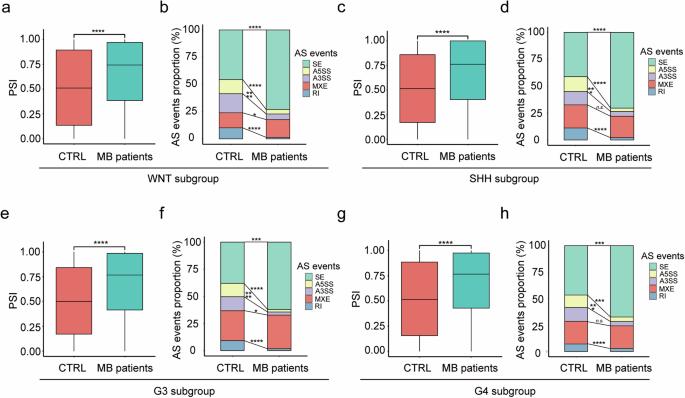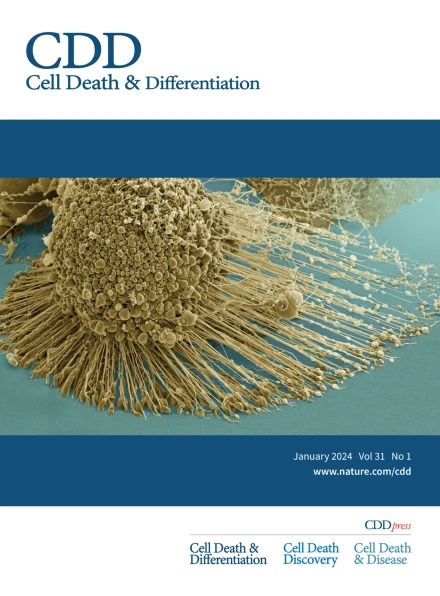Alternative spliceosomal protein Eftud2 mediated Kif3a exon skipping promotes SHH-subgroup medulloblastoma progression
IF 15.4
1区 生物学
Q1 BIOCHEMISTRY & MOLECULAR BIOLOGY
引用次数: 0
Abstract
Alternative splicing plays a pivotal role in various facets of organogenesis, immune response, and tumorigenesis. Medulloblastoma represents a prevalent childhood brain tumor, with approximately one-third classified as the Sonic Hedgehog (SHH) subgroup. Nevertheless, the contribution of alternative splicing to medulloblastoma oncogenesis remains elusive. This investigation delineated an upregulation of the spliceosomal protein Eftud2 in the SHH-subgroup medulloblastoma mouse model and human medulloblastoma patients. Targeted ablation of Eftud2 in granule precursor cells (GNPs) within the cerebellum prolonged the survival of SHH-subgroup medulloblastoma mice, indicating a putative association between Eftud2 expression and medulloblastoma prognosis. Functional assays unveiled that EFTUD2 depletion in human medulloblastoma cells significantly curtailed cellular proliferation by impeding the activation of the SHH signaling pathway. Through multi-omics sequencing analysis, it was discerned that Eftud2 influences exons 10–11 skipping of Kif3a, a kinesin motor critical for primary cilia formation. Notably, exons 10–11 skipping in Kif3a augmented human medulloblastoma cell proliferation by potentiating the transcriptional activity of Gli2. These findings underscore a robust correlation between Eftud2 and SHH-subgroup medulloblastoma, emphasizing its regulatory role in modulating downstream transcription factors through the alternative splicing of pivotal genes within the SHH signaling pathway, thereby propelling the aggressive proliferation of SHH-subgroup medulloblastoma.


替代剪接体蛋白Eftud2介导的Kif3a外显子跳越促进SHH亚群髓母细胞瘤的发展
选择性剪接在器官发生、免疫反应和肿瘤发生的各个方面起着关键作用。髓母细胞瘤是一种常见的儿童脑肿瘤,其中约三分之一属于Sonic Hedgehog (SHH)亚群。然而,选择性剪接对成神经管细胞瘤癌变的贡献仍然是难以捉摸的。本研究揭示了shh亚组成神经管细胞瘤小鼠模型和人成神经管细胞瘤患者剪接体蛋白Eftud2的上调。靶向消融小脑颗粒前体细胞(GNPs)中的Eftud2可延长sh亚组成神经管细胞瘤小鼠的生存期,提示Eftud2表达与成神经管细胞瘤预后之间可能存在关联。功能分析显示,人髓母细胞瘤细胞中的EFTUD2缺失通过阻碍SHH信号通路的激活显著抑制细胞增殖。通过多组学测序分析,发现Eftud2影响Kif3a外显子10-11的跳跃,Kif3a是一种对初级纤毛形成至关重要的运动蛋白。值得注意的是,Kif3a外显子10-11的跳跃通过增强Gli2的转录活性来增强人髓母细胞瘤细胞的增殖。这些发现强调了Eftud2与SHH亚群成神经管细胞瘤之间的强大相关性,强调了其通过SHH信号通路中关键基因的选择性剪接来调节下游转录因子的调节作用,从而促进SHH亚群成神经管细胞瘤的侵袭性增殖。
本文章由计算机程序翻译,如有差异,请以英文原文为准。
求助全文
约1分钟内获得全文
求助全文
来源期刊

Cell Death and Differentiation
生物-生化与分子生物学
CiteScore
24.70
自引率
1.60%
发文量
181
审稿时长
3 months
期刊介绍:
Mission, vision and values of Cell Death & Differentiation:
To devote itself to scientific excellence in the field of cell biology, molecular biology, and biochemistry of cell death and disease.
To provide a unified forum for scientists and clinical researchers
It is committed to the rapid publication of high quality original papers relating to these subjects, together with topical, usually solicited, reviews, meeting reports, editorial correspondence and occasional commentaries on controversial and scientifically informative issues.
 求助内容:
求助内容: 应助结果提醒方式:
应助结果提醒方式:


